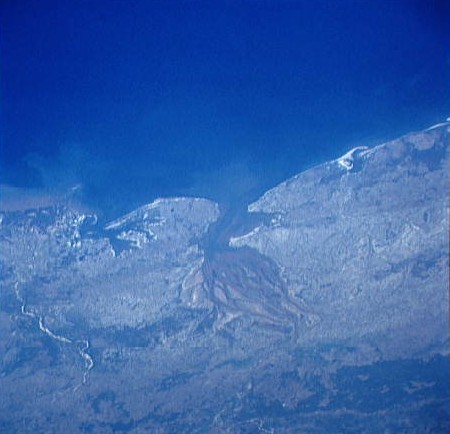And it Was Good
This spring day, we look at Earth and see that it is good. The University of Houston's College of Engineering presents this series about the machines that make our civilization run, and the people whose ingenuity created them.
Saturday afternoon, the day before Easter, I went to an Earth Day celebration in a large house that doubles as an environmental consulting office. It was nice. A table was filled with fine herbal vegetarian dips and canapes. Live music in the hallway. Upstairs I walked through computer-intensive offices where experts could scan NASA photos of our Island Earth. Serious science was going on in a counter-cultural setting.
That evening, the Easter Vigil began throughout Christendom with the powerful words from Genesis, "In the beginning God created the heaven and the earth." For me, the text brought back another view of our Island Earth:
It was the most dramatic moment in the whole space program. On Christmas Eve, 1968, astronaut Frank Borman rode his orbiter around the far side of the moon. He was the first living creature to gaze on that surface. As he did, he read the same Genesis text to all of us down on Earth's surface.
That rhythmic episodic text flows flawlessly through the elements of creation -- the planets, the seas, the grass and trees, the beasts, and Frank Borman's moon. It is punctuated with the recurring mantra, "and God saw that it was good."
Aaron Copland wrote his most powerful work around the Genesis text. It's a setting for virtuoso contralto and unaccompanied chorus. The solo voice drives us insistently -- let the sun and moon "be for signs, and for seasons, and for days, and years." The chorus gently replies, over and over, "and God saw that it was good."
So I walk through this office home and trace the satellite photos of our good earth. I see the great red stain of contaminated rivers in Madagascar. I see the muddy blur hovering over Houston. I see gray reaches in the Amazon Rain Forest.
A peculiar Easter theme has touched me this spring. It has been an acute awareness of the magnitude of the gift of the world we live in. It has also been a resurrection theme. For we have nearly killed the world we ought to love above all things. Now we must bring it back to health and vitality.
There is, after all, no perfect "balance of nature" that would exist in our absence. We are part of nature's equation. Any definition of nature includes us and our actions in it. We are responsible parts of nature. We take greater responsibility in that equation every year.
We well may tremble for the responsibility! What an awesome, life-giving, obligation! What a stern demand that we keep our wits about us -- and our hearts in the right place.
I'm John Lienhard, at the University of Houston, where we're interested in the way inventive minds work.
(Theme music)
The Earth Day celebration took place at the International Center for the Solution of Environmental Problems. They do a variety of consulting and can be reached at 713-527-8711. The title of the Copland cantata is In The Beginning.

Image courtesy of NASA

NASA photo of Madagascar mud being carried into the Indian Ocean